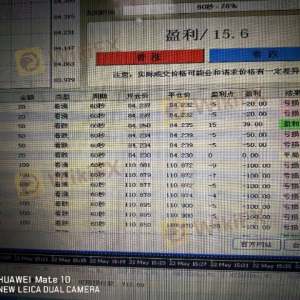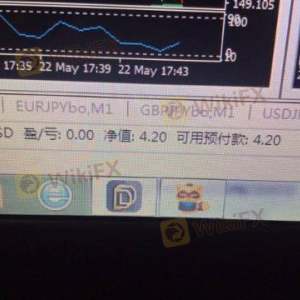Is DTT safe?

Pros
Cons
Is DTT A Scam?
Introduction
DTT, or Direct Trading Technologies, has emerged as a player in the foreign exchange market since its establishment in 2018. Positioned as a broker offering a wide range of trading instruments, including forex, commodities, and cryptocurrencies, DTT aims to cater to both novice and experienced traders. However, with the increasing number of unregulated brokers in the market, it is crucial for traders to exercise caution and thoroughly evaluate the legitimacy of any trading platform. This article aims to provide an objective assessment of DTT's credibility, focusing on its regulatory status, company background, trading conditions, client fund safety, customer experiences, platform performance, and associated risks.
To conduct this investigation, we sourced information from various reputable financial websites and reviews, including regulatory disclosures and user feedback. Our assessment framework includes evaluating the broker's regulatory status, company history, trading conditions, and client interactions to determine whether DTT is safe for trading or potentially a scam.
Regulation and Legitimacy
The regulatory environment surrounding forex trading is essential for ensuring the safety and security of traders' funds. A broker's regulatory status often reflects its commitment to adhering to industry standards and protecting clients. DTT claims to be regulated in New Zealand, but several reviews and reports raise concerns about the legitimacy of its regulatory claims. Below is a summary of DTT's regulatory information:
| Regulatory Authority | License Number | Regulatory Region | Verification Status |
|---|---|---|---|
| FSPR | 345966 | New Zealand | Suspicious Clone |
| FCA | 795892 | United Kingdom | Suspicious Clone |
| VFSC | 40169 | Vanuatu | Suspicious Clone |
The above table highlights that DTT operates under licenses that are often flagged as suspicious clones. This raises significant concerns about the broker's regulatory compliance and overall legitimacy. The lack of a credible regulatory authority overseeing DTT means that traders may not have access to essential protections, such as compensation schemes in the event of insolvency or fraud. Furthermore, the absence of negative regulatory disclosures during the evaluation period does not necessarily guarantee the broker's safety, as many unregulated entities can operate without proper oversight.
Company Background Investigation
DTT was established in 2018, and while it presents itself as a legitimate trading platform, there are serious questions regarding its corporate structure and transparency. The company's ownership and management team lack public visibility, which is a red flag for potential investors. A transparent company should ideally provide clear information about its founders and management team, allowing traders to assess their expertise and experience.
Despite claims of operating from New Zealand, reports indicate that DTT's physical presence may not exist at the stated address. This lack of transparency raises concerns about the broker's operational integrity and the potential for fraudulent activities. Furthermore, the absence of verifiable information regarding the company's management team and their qualifications adds to the skepticism surrounding DTT's credibility.
Trading Conditions Analysis
When evaluating a broker, understanding the trading conditions is vital for determining its overall value and reliability. DTT offers various account types with different fee structures and trading conditions. However, some of these conditions may not align with industry standards. Below is a comparison of DTT's core trading costs:
| Fee Type | DTT | Industry Average |
|---|---|---|
| Major Currency Pair Spread | 0.0 pips | 1.0 - 2.0 pips |
| Commission Model | Zero | Varies |
| Overnight Interest Range | Unspecified | Varies |
DTT claims to offer spreads as low as 0.0 pips, which is exceptionally competitive. However, the lack of transparency regarding the typical spread and commission structures raises questions about the broker's overall trading costs. Furthermore, the absence of clear information on overnight interest rates could lead to unexpected costs for traders. This opacity in fee structures can significantly impact a trader's profitability and overall trading experience.
Client Fund Safety
The safety of client funds is paramount when selecting a forex broker. DTT claims to implement various safety measures, including segregated accounts for client funds. However, the lack of credible regulatory oversight raises concerns about the effectiveness of these measures. A broker that operates without stringent regulations may not have adequate safeguards in place, putting traders' investments at risk.
Additionally, there have been reports of withdrawal issues and delays, which further complicate the assessment of DTT's fund security. Traders have raised concerns about their inability to withdraw funds promptly, suggesting potential liquidity issues or operational inefficiencies. These historical concerns about fund safety warrant caution when considering whether DTT is safe for trading.
Customer Experience and Complaints
Analyzing customer feedback is essential for assessing a broker's reliability. Reviews of DTT reveal a mixed bag of experiences, with several users reporting issues related to withdrawal delays and poor customer service. Common complaint patterns include:
| Complaint Type | Severity | Company Response |
|---|---|---|
| Withdrawal Delays | High | Slow Response |
| Poor Customer Support | Medium | Automated Replies |
The severity of complaints regarding withdrawal issues is particularly alarming, as it directly impacts traders' access to their funds. Additionally, the slow response times from customer support indicate a lack of adequate resources to address client concerns effectively. These issues raise significant doubts about DTT's commitment to providing a satisfactory trading experience.
Platform and Trade Execution
The performance of a trading platform is critical for traders, as it affects order execution quality and overall user experience. DTT offers multiple trading platforms, including the popular MetaTrader 4 and its proprietary DTT Pro platform. While these platforms are generally well-regarded, concerns regarding order execution quality and potential slippage have been raised by users. Traders have reported instances of slippage during high-volatility periods, which can significantly affect trading outcomes.
Moreover, there are indications of possible platform manipulation, which could compromise the integrity of the trading experience. Traders must be vigilant and assess whether DTT's platforms meet their trading needs without compromising execution quality.
Risk Assessment
Engaging with any broker inherently involves risks, and DTT is no exception. The following risk assessment summarizes key risk areas associated with trading through DTT:
| Risk Category | Risk Level (Low/Medium/High) | Brief Explanation |
|---|---|---|
| Regulatory Risk | High | Lack of credible regulation |
| Fund Safety Risk | High | Reports of withdrawal issues |
| Customer Service Risk | Medium | Poor customer support responsiveness |
| Platform Risk | Medium | Potential execution issues |
Given the high-risk levels associated with DTT, traders should exercise extreme caution. It is advisable to implement risk mitigation strategies, such as limiting exposure and diversifying investments, to protect capital.
Conclusion and Recommendations
In conclusion, the evidence suggests that DTT may not be a safe option for trading. The broker's suspicious regulatory status, lack of transparency in its corporate structure, concerning trading conditions, and negative customer experiences raise significant red flags. While DTT offers competitive spreads and a range of trading instruments, the potential risks outweigh the benefits.
For traders seeking a reliable and secure trading environment, it is advisable to consider alternatives that operate under reputable regulatory oversight and have a proven track record of client satisfaction. Brokers such as IG, OANDA, or Forex.com may provide a more trustworthy trading experience, ensuring that traders' funds are safeguarded and that they receive the support they need. Ultimately, thorough research and cautious decision-making are essential in the ever-evolving landscape of forex trading.
Is DTT a scam, or is it legit?
The latest exposure and evaluation content of DTT brokers.




DTT Similar Brokers Safe
Whether it is a legitimate broker to see if the market is regulated; start investing in Forex App whether it is safe or a scam, check whether there is a license.
DTT latest industry rating score is 1.60, the higher the score the safer it is out of 10, the more regulatory licenses the more legitimate it is. 1.60 If the score is too low, there is a risk of being scammed, please pay attention to the choice to avoid.